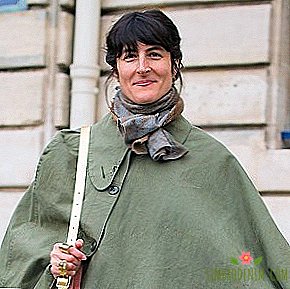The Invisible Man: How do books about LGBT people hide from Russian children?
In early November, it became known that in the Russian version of Helena Favilli and Francesca Cavallo's "Bedtime Stories for Young Rebel", which was published by the publishing house "Bombora" (included in "Eksmo"), not a hundred fairy tales, as in the original, but ninety-nine: they removed the story from the translation transgender girl Coy Mathis. “When releasing the work, we decided that the book is interesting for Russian girls to read, even in abbreviated form,” commented Darya Shpileva, PR manager of the Bombora publishing house, commenting. Unfortunately, it’s impossible to publish the full version in Russia. We respect everyone’s choice reader and we apologize if this situation has hurt someone's interests. "
We decided to find out whether LGBT topics in general reach children and teenagers in Russia - and if so, how.

alexander savina

"Fairy tales for rebel" turned out to be in an anecdotal situation, the hundredth fairy tale readers are invited to simply invent themselves. But publishing books in Russia that mention the topic of LGBT is really difficult. In the summer of 2013, the president signed a federal law prohibiting "the promotion of non-traditional sexual relations among minors"; relevant amendments were made to the Federal Law "On the Protection of Children from Information Harmful to their Health and Development." The ban turned out to be “the dissemination of information aimed at shaping non-traditional sexual attitudes among minors, the attractiveness of non-traditional sexual relationships, a distorted view of the social equivalence of traditional and non-traditional sexual relationships, or the imposition of information about non-traditional sexual relationships that arouses interest in such relationships.”
Referring to the vague rule of law, the Bombora publishing house at least confuses the concepts of gender and sexuality, illustrating how self-censorship works: just in case, you have to be afraid of everything at once. European and American authors often talk to readers about diversity, including different types of sexuality and gender identity. And the problem of whether to expose the mention of an LGBT representative from a Russian translation, sooner or later each publisher decides for itself, publishing books for the "non-adult" category of readers.
In the case of literature for children and adolescents, “propaganda” threatens publishers with a fine of eight hundred thousand to one million rubles or administrative suspension of activity for up to ninety days. For obvious reasons, very few are prepared to take this risk.
Prohibited literature
Of course, it’s impossible to say that the world doesn’t classify readers by age and access to information, for example, to intimate topics. For many types of media products there are age ratings: the child is unlikely to be allowed on a film marked “R”, like “Deadpool”, and they are unlikely to be sold fresh Playboy. Lettering markings for books is not provided, but this does not mean that children in the West are not trying to protect from something that supposedly can harm them: for example, a teenager in a bookstore may refuse to sell "Fifty shades of gray." Since 1982, the Week of Prohibited Books has been held in the USA - it is arranged by the American Library Association and Amnesty International, who want to draw attention to reading censorship.
Historically, children tried to ban a variety of books - for example, those that are associated with magic (and therefore can "offend the believers"), like the books of JK Rowling and Philip Pullman. Books of ideas of diversity and tolerance, covering topics of origin, mental health, disability, sexuality, and gender identity, also fall under the barrage of conservative criticism. For example, in one of the American schools they tried to ban a book about a transgender girl Jazz Jennings. Nevertheless, there are no mass, let alone national prohibitions in the country - these could be initiatives of parents, religious activists, conservative organizations or a specific school, but not the state. So even if a book was banned at a local school, it is highly likely that a child will be able to take it from the library.
Books dedicated to ideas of diversity and tolerance, covering topics of origin, mental health, disability, sexuality and gender identity, also fall under the barrage of conservative criticism
In Russia, the information that a child of a specific age can receive is governed by the Federal Law “On Protecting Children from Information Harmful to their Health and Development”. There are several types of information product labeling, which also includes books: "0+", "6+", "12+", "16+" and "18+" (that is, books for adults). In the category of "0+", violence (physical or psychological, but not sexual) can be unnaturally shown - provided that it is condemned and goodness wins. In books "6+" there can be short non-natural descriptions of not serious diseases, descriptions of accidents, accidents and catastrophes (again non-natural and provided that they do not upset the child and their consequences are not shown), as well as descriptions of crimes, if they do not child repeat them. In the category of "12+" cruelty or violence (but not sexual) can be unnaturally portrayed, provided that they are condemned and the victim sympathized. In addition, alcohol and drugs may be mentioned if their use is condemned, as well as "not exploitative interest in sex and not exciting or offensive" sexual relations between a man and a woman - if they are shown unnaturally. Sixteen-year-olds can, among other things, read foul language in the book.
Finally, the category "18+" permits any content, if it is not prohibited by other laws (for example, the book is considered extremist), including the mention of sexual orientation other than "traditional" - only heterosexual relationships can get into other categories. In addition, the law makes the requirements for the appearance of books "18+": they must be sold in sealed form (most often it is a transparent cellophane package, through which the cover is visible, but the book cannot be looked through), and the marking itself must be noticeable. The law states that its action does not apply to works that have "significant historical, artistic or other cultural value for society" - but the law does not specify how to determine this with each particular book.
Formally, there are no questions to the literature designed for adult readers: “Goldfinch” by Donna Tartt and “Little Life” by Chania Yanagihara, about homosexual teenagers, with the label “18+” successfully reached the readers. However, the marking, as explained to us by the Corpus publishing house, was not used at all so that children would never know the word "gay", but because some of the described violence scenes are not intended for teenagers until eighteen.

No topic - no book
The logical result of the prohibitions is that many books that mention LGBT heroes simply do not reach the readers. “There are practically no such books,” says Nadezhda Kruchenitskaya, editor-in-chief of the Pink Giraffe Publishers. “In some books the topic is touched upon, but every time the publisher takes a risk. It’s simply impossible to publish a book that would speak directly about the LGBT community. that law enforcement practice in Russia any education on the topic of sexuality (even heterosexuality) or the mention of "non-traditional sexual relations" calls them propaganda, which is prohibited by law. " The Pink Giraffe Publishing House was forced to abandon the publication of many books for precisely this reason: the staff were simply not ready to cut out the relevant episodes or storylines. The interlocutor in one of the publishing houses told us that many were looking narrowly at the notorious “one hundred tales”, but “no one took any more risks.”
“Russian publishers cannot, without breaking the law, tell underage readers about the existence of homosexual relations, not condemning or denouncing them,” admits Tatyana Koroleva, editor of Popcorn Books. “Given that we have been living with this law for five years, probably ours society is not yet ready to recognize such relations as the norm. And I think that even if a rebel publishing house appears, it is unlikely that it will be supported by readers, shops and the publishing community as a whole. "
A couple of years ago several encyclopedias on sexual education came under criminal prosecution. Public organization "Ural parent committee" saw in them signs of "pornography"
Last year, even Eksmo co-owner Oleg Novikov spoke about the difficulties due to laws protecting childhood, “In some situations, we are forced to abandon the purchase of rights to books that could otherwise have been published in Russia in very large numbers” . According to him, the publishing house didn’t have any problems due to LGBT heroes and relevant stories, but at the end of 2015 Roskomnadzor withdrew Stays Kramer’s book “50 days before my suicide” from stores (publishers make up one holding) - although there is no suicide as such.
Not only LGBT people are cut - many other topics are stopping, confirms the public relations director of the Samokat publishing house Maria Orlova, for example, with descriptions in the genital books. A couple of years ago, several encyclopedias on sexual education for publishing houses AST and Eksmo and a teenage novel “With whom to run” by David Grossman came under criminal prosecution. The public organization "Ural Parents' Committee" saw in them signs of "pornography," but the examination did not confirm the suspicion, and the case was closed.
In 2013, there was a scandal around the book "Flags of the World for Children" by KompasGid publishing house by French writer Sylvie Bednar. State Duma deputy from United Russia, Alexander Khinshtein, being at the store shelf, opened the book on a specific page and was outraged by the line that red in the Lithuanian flag is "the color of blood spilled by Lithuanian people in the struggle against Russians and German invaders" . Bookstores in a panic began to abandon the "unreliable" edition for children.
But the LGBT topic is obviously one of the most risky. “It practically does not appear in Russian authors,” says Maria Orlova. “And it seems to me that there are simply no good texts that could be on the Russian market because of the topic.”
Eighteen and older
One of the solutions that are used by publishers of children's and teenage literature in cases where the LGBT theme is mentioned in books is a change in labeling. Ksenia Kovalenko, editor-in-chief of Belaya Vorona Publishing House, for example, says that books designed for children twelve years old and older are forced to put the mark “18+”. Popcorn Books has the book Simon and the Homo sapiens program, which is originally defined as the coming-of-age story, that is, the story of growing up. It is designed for older schoolchildren and students - teenagers and young people of 16-25 years old - but on the Russian market it received the mark "18+". The change of labeling ended the epic "Eksmo": the publishing house re-released Kramer with the mark "18+", and its name changed to "I choose life: 50 ddms".
An employee of one of the publishing houses, who wished to remain anonymous, explained that "such books" in her company are positioned as publications "for adult youth." According to her, the courage of publishers generally depends on the “star” of the author or the book itself: “In the West, LGBT books often become bestsellers, and the publisher can turn a blind eye to the topic and buy rights if Russian readers already know about the book. Popularity of the author and the book directly affects the decision to purchase rights to LGBT literature, "she adds.
Publishers recognize that labeling manipulations have their costs. "18+" automatically leads to the disappearance of the book from the children's departments, that is, it greatly reduces the audience to which it is addressed.
Maria Orlova, PR director of the Samokat publishing house, says that the publishing house tried to protest against the adoption of laws censoring children's and teen books. “But the propaganda law was adopted, so we have what we have,” she reasons. “Once we released the book by Marie-Od Myuray“ Oh, boy! ”- many children read it, we regard it as a book for readers eleven or twelve years old. One of its main characters is gay. In 2014, after the adoption of the law, for the sake of its reissue, we specifically established the series “Non-Child Books”, in which all the markings that the law requires are brought to the state of the Italian strike. sealed in cellophane, they have white, sterile covers, they have a special lichenie age labeling. In "Oh boy!" flaunts "18+" and a skull with crossed bones. "
The publisher is indicative of marking books with the "18+" sign: "Where we manage to have our say, we declare that we never need to look at the marking. The best recommendation is not an indication of a law that does not take into account any age features, but editorial addressing" - advises the PR director of Scooter.
Publishers recognize that labeling manipulations have their costs. "18+" automatically leads to the disappearance of the book from the children's departments, that is, it greatly reduces the audience to which it is addressed, which means sales. “No matter how you explain that“ 18+ ”on the cover does not mean anything, the book will not get into the children's section - we are the publisher of children's and teenage literature, and our main consumers are there,” says Maria Orlova. “If our book turns out to be an adult department, this guarantees her lack of sales - she will look like a nursery and will not find her reader, she will simply not be noticed. We are forced to refuse any books, because we understand that a sad fate awaits them. "
There is one more nuance with the “adult” labeling of literature for children and teenagers: even if it turns out to be in the hall of a bookstore, it may simply not be sold to a minor. Periodically, this happens even with the classics from the regular or extended school curriculum. For example, in early autumn a schoolgirl from Yekaterinburg refused to sell collections of Vladimir Mayakovsky, Sergey Yesenin and Joseph Brodsky with the mark "18+". Two years ago, the literary critic Anna Narinskaya told about a similar case: her fifteen-year-old son wasn’t sold Victor Hugo’s novel “The Man Who Laughs” with a “16+” mark. Of course, there is a possibility that parents will buy a book with “non-child” markings for the child — or that he will be able to purchase it in the online store, where it is more difficult to check the age of the client. But there is no guarantee that the book will find its reader.

"Make bills"
Sometimes publishers are not ready to abandon the book completely or put on it the label "18+". In such cases, they, like Bomborah, prefer to cut out text fragments that go beyond the law. “Alas, we have to make bills even in popular science books where LGBT mentions are mentioned,” says Ksenia Kovalenko, editor-in-chief of Belaya Vorona Publishing House. “It’s a shameful appeal to the authors to shorten the text, but so far everyone has treated with understanding and We came forward to meet. I think that this is an abnormal situation and it is precisely the concealment of the facts that is harming the child’s development. "
A similar situation in the publishing house "Scooter". Where it is possible to allow double reading of the text and it is impossible to make an unequivocal conclusion about the homosexuality of the characters, publishers try to put markings appropriate to the text and age of readers, for example, “12+”: “A smart reader will understand everything, but I don’t want to draw attention to this” says Maria Orlova. So it was with the book "Report on jellyfish" - according to the PR director, the reader can perceive the relationship between the main character’s brother and one of the characters in a different way. "We had to cut out one small scene, so as not to deprive readers of the text - so no expert can prove that the characters are not just friends. I must say that this is absolutely not important for the text story - they are friends or a couple - it does not carry key text load. "
Cutting fragments from the Russian version of the book does not always go smoothly. For example, a year ago, the writer Victoria Schwab accused the publishing house "Rosman" that the love line of gay characters had seriously changed in the Russian translation of her series "Shades of Magic". She learned about this thanks to the Russian reader, who compared the translation with the original. Natalya Brovchuk, a spokeswoman for the publishing house, justified that only one scene was edited in the book so as not to violate the law banning “propaganda”: “Of course, we have preserved the romantic line as a whole”. But the writer still broke the contract with "Rosmen", and the books were published by the publishing house "AST" - already marked "18+".
Даже в ситуации тотальных запретов полностью оградить детей и подростков от информации вряд ли получится: если они не смогут купить бумажную книгу, они наверняка найдут другие способы её прочесть
Даже в ситуации тотальных запретов полностью оградить детей и подростков от информации вряд ли получится: если они не смогут купить бумажную книгу, они наверняка найдут другие способы её прочесть. "Спрос на ЛГБТ-литературу, безусловно, есть, - говорит редактор Popcorn Books Татьяна Королёва. - Очень много книг об однополой любви, написанных для детей и подростков, переводят любители и выкладывают в Сеть. There are probably no readers up to ten years old there, but teenagers are actively interested in similar communities. In addition, this topic is very popular in fan fiction, which, again, more read, and often teenagers write. Interest in homosexuality is a natural part of an awakening interest in sex in general, which is an integral part of growing up. And, of course, heterosexual teens need to be told about the existence of homosexual relationships. "
"Of course, there are a lot of protective tendencies, and they do not give these texts in principle to appear. And this is a very unhealthy situation when Russian authors do not create new works about modernity, about the self-perception of a teenager and a person in this country in this particular period. You cannot to reflect on their own time, - says Maria Orlova. - It seems to me that it is very beneficial for the state to search for an internal enemy, and now the LGBT community has turned out to be this enemy. ”
“In our society, it is forbidden to talk with children about sex in general. Apparently, this part of life is still perceived by us as shameful and unnatural,” Tatiana Koroleva believes. “In my opinion, we need to talk with many adults about sex as children.” . Regardless of the risks, self-censorship is sometimes excessive. In 2007, JK Rowling spoke about the homosexuality of one of the main characters in the Harry Potter book series, Hogwarts director Albus Dumbledore (nothing is said directly in the books themselves about the sexuality of the hero). But they are still considered childish - there is a “6+” label on the latest editions.
Photo: 3dsguru - stock.adobe.com, Noel - stock.adobe.com, justtscott - stock.adobe.com (1, 2, 3, 4)





